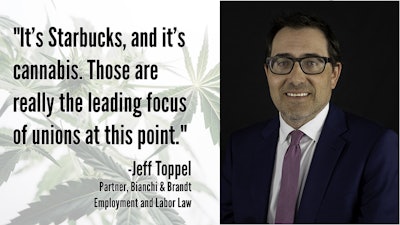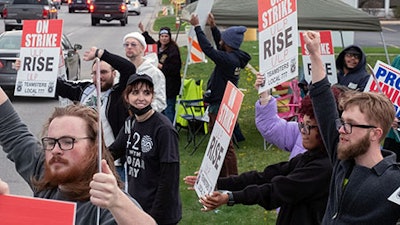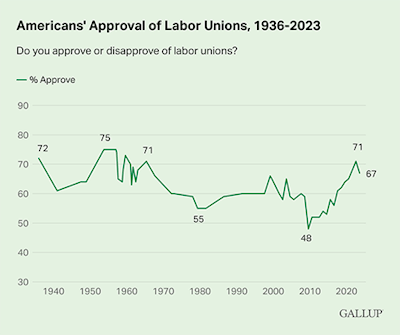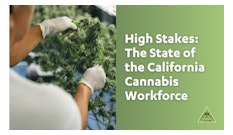
It’s going to take more than a few coffeeshops or cannabis dispensaries to ignite the next wave of unionization in America, but workforce organizers have adjusted their sails during a time of historic lows.
In 2022, the union membership rate for wage and salary workers hit an all-time bottom of 10.1%, down 0.2% from the previous year, with the total number of workers belonging to unions at 14.3 million, according to union data from the U.S. Bureau of Labor Statistics. While the number of union workers increased by 273,000 in 2022, the total number of workers grew more rapidly.
In 1983, the first year of comparable data from the Bureau of Labor Statistics, America’s union membership rate was 20.1% with 17.7 million workers unionized. However, the percentage of workers belonging to a union peaked at roughly one in three Americans in the mid-1950s, when public support was at an all-time high, according to the National Bureau of Economic Research.
But labor unions trying to reverse this historical trend are fighting to organize workers from emerging companies and industries, including Amazon, Apple and Starbucks, according to a pro-union White House that in late 2022 declared “organized labor appears to be having a moment.”
As a lead target for unions trying to expand their membership in today’s workforce, Starbucks saw thousands of workers from more than 250 coffeehouses voting to unionize in 2022.
And as more states legalize cannabis—including Delaware, Minnesota, Ohio and Kentucky (medical) in 2023—dispensary workers are increasingly joining this effort to turn the corner for unionization in American.
“Really what we’re seeing now, and I guess in reality they’re two staples of consumer: It’s Starbucks, and it’s cannabis. Those are really the leading focus of unions at this point,” Jeff Toppel, partner at Bianchi & Brandt, told Cannabis Business Times.
Cannabis: A Big Deal
With a specialty in national employment and labor laws, Toppel represents primarily employers in all types of labor and employment matters, including in their union organizing campaigns or other union-related affairs if they’re already unionized. He has appeared before the National Labor Relations Board (NLRB) countless times to argue union cases.
In the mid-2000s and 2010s, unions started to look at industries beyond their traditional reach that were viewed as ripe for organizing, Toppel said. This came at a time when the U.S. lost roughly one-third of its manufacturing jobs between 2000 and 2010, accord to the Bureau of Labor Statistics.
Many organizing efforts didn’t take hold, but unions are always looking for new members, Toppel said.
Specifically, the United Food and Commercial Workers (UFCW) labor union, made up of roughly 1.2 million workers in the U.S. and Canada, put its crosshairs on the cannabis industry in 2011 via launching the Cannabis Workers Rising campaign. Sixteen states had legalized medical cannabis at that time.
That number has since grown to 38 states, including 24 that have legalized adult-use cannabis since 2012. The space now supports more than 400,000 jobs.
“The UFCW really recognized [early on] that this was going to be a big deal,” Toppel said.
Pro-Union States
The UFCW’s push to unionize cannabis workers only picked up steam when New York passed medical cannabis legislation in 2014 that required, as a pre-condition for receiving a license, cannabis businesses to enter into a labor peace agreement with a bona fide labor organization. New York specifically had the second highest union membership rate (20.7%) in the nation after Hawaii in 2022, according to the Bureau of Labor Statistics.
California Gov. Gavin Newsom signed a similar law into effect in 2019, one that required cannabis retail facilities to enter into a labor peace agreement as soon as they have 20 or more workers. The law requires this to happen within 60 days.
New Jersey followed suit with its adult-use cannabis launch in April 2021, requiring licensees to enter into a collective bargaining agreement with a union within 200 days from the start of business or risk hefty fines from the state’s union-focused Cannabis Regulatory Commission.
Also in April 2021, Virginia’s former Gov. Ralph Northam signed legislation that gave the state’s incoming Cannabis Control Authority the power to strip licenses from any cannabis business that doesn’t remain neutral while its workers attempt to unionize.
And in June 2021, UFCW applauded Connecticut’s passage of an adult-use cannabis law that requires industry participants to enter a labor peace agreement prior to licensing.
RELATED: What To Know About Labor Peace Agreements in Cannabis
But when businesses are forced into these labor peace agreements, sometimes that leads to employers looking for a good deal rather than perhaps what some of these laws are intended to accomplish, which would be to get the best deal for the employees, Toppel said.
“There have been some challenges in California in the cannabis industry relating to that issue,” Toppel said. “By requiring [labor peace agreements] you sort of strike a deal. It doesn’t allow the employees to find the right union for them and select the representative of their own choosing, which is sort of the underlying purpose of all these statutes: It’s supposed to really focus on the employees’ rights.”
Oregon’s Union Measure
In addition to the five states mentioned above, Oregon could potentially vote on a November 2024 ballot initiative that would require cannabis businesses to submit labor peace agreements with state regulators for licensure or renewals. This potential vote would come 10 years after Oregonians voted to legalize adult-use cannabis via Measure 91.
Filed by the UFCW Local 555, Oregon’s 2024 unionization of cannabis workers petition specifically states that “due to ambiguity in federal law, cannabis workers are being denied workplace rights.”
But this isn’t necessarily true, Toppel said. Cannabis workers still have the right to organize under the National Labor Relations Act, as seen in many cases elsewhere, he said.
“The premise of that statute, and I think a lot of the other statutes that seek to require labor peace agreements, is this false premise that [cannabis workers are] not given the full gamut of federal law, of federal protections, because they’re in cannabis,” Toppel said, adding that he thinks the measure could pass should it reach the ballot.
Unfair Labor Practice
Even without these forced labor peace agreements, cannabis retail workers have actively organized in large numbers in recent years, notably through two mainstream unions:
- The UFCW, which now represents “tens of thousands” of cannabis workers in dispensaries, labs, delivery, manufacturing, processing and grow facilities; and
- The International Brotherhood of Teamsters, which has organized more than a thousand cannabis workers in states like California, Illinois, Michigan, Missouri and Ohio.
These two labor unions have filed a growing number of unfair labor practice charges against cannabis companies since the onset of COVID-19, including against some of the largest publicly traded operators in the industry.
Notably, the NLRB ruled in December 2022 that Curaleaf’s refusal to recognize and bargain with unionized dispensary workers who voted to join the UFCW in Chicago was “unlawful.” Separately, the NLRB took 10 months to investigate an April 2020 union election of Curaleaf dispensary workers in Hanover, Mass., before the company recognized the final vote count.

Also in the Chicago area, more than 100 unionized workers at three RISE dispensaries owned by Green Thumb Industries engaged in a 13-day unfair labor practice strike because the company “demanded that the workers remove” their pro-union insignias while at work as part of a “broader pattern of disrespect to their workforce,” according to Teamsters Local 777 President Jim Glimco. Later, the union filed additional unfair labor practice charges against Green Thumb for “spying” on its dispensary workers.
Curaleaf and Green Thumb, the largest publicly traded cannabis companies in the world by market cap, often grab the headlines. But part of the beast of being big is having thousands of employees who have varying degrees of satisfaction in their work-related matters.
Overall, cannabis businesses aren’t any more or less resistant to labor peace agreements than other industries, Toppel said.
New Union Standard: Cemex
One reason there’s an uptick in union activity as it relates to filings is because the NLRB is a “very, very pro-labor, pro-union board right now, and they’re pretty open about it,” he said.
“It’s an environment where unions recognize that now is the time, and there’ve been some major changes that the NLRB [made] in the last few months, really to make it significantly easier to organize,” Toppel said, adding that these changes weren’t cannabis-specific decisions but do impact cannabis employers/employees.
Perhaps most notable, the NLRB issued a decision in late August commonly referred to as Cemex, which fundamentally alters how employees can unionize.
Instead of allowing employers to reject union demands for voluntary recognition should the union provide evidence of majority support in a workplace, such as a signed letter, the employer must either voluntarily recognize the union or file for an election.
If the employer chooses to do neither, then the union can file an unfair labor practice charge. And should the NLRB find that an employer commits an unfair labor practice, such as discouraging its workers from supporting a union, then the employer can be forced to bargain with the union—whether or not an election is held.
“[Cemex] really completely changed 50 years of case law of how unions organize,” Toppel said. “It wasn’t a cannabis-specific case, but it had impact to all employers.”
In addition, the Cemex standards can be retroactively applied to union matters, he said.
Massachusetts Union Vote Reversed
Since August, Cemex has already been applied to at least two cannabis employers, including INSA Inc., whose dispensary workers in Salem, Mass., voted, 17-11, against joining the UFCW Local 1445 in 2022.
This came after INSA received a letter in January 2022 signed by the majority of its retail workers demanding that the company recognize and bargain with the UFCW. The union petitioned for an election four days later.
But after INSA received that letter, the UFCW alleged that the company conducted unlawful, union-busting tactics, including mandatory meetings to discourage employees from supporting the union and retaliation threats against the employees, among others, according to NLRB Administrative Law Judge Andrew Gollin.
Gollin ruled in a September 2023 decision—a month after Cemex—that INSA “engaged in objectionable conduct affecting the results of the election” and ordered the company to negotiate with the UFCW despite the election results.
Gollin referred to the Cemex case, stating that “if the employer commits an unfair labor practice that requires setting aside the election, the petition … will be dismissed, and the employer will be subject to a remedial bargaining order.”
In addition, Gollin ordered INSA to rehire two employees who were fired and “make them whole for any loss of earnings and other benefits suffered as a result of the discrimination against them.”
Toppel called Gollin’s ruling “pretty incredible.”
“So, even though the law was not in place at that time, the judge applied it retroactively and reversed a decision in which a cannabis employer won the election,” he said.
Missouri Dispensary Settlement
The other cannabis-related case where Cemex standards have already been applied happened in Columbia, Mo., where a $145,000 settlement involving 10 fired workers was reached in late October between dispensary licensee Point Management (doing business as Shangri-La) and the UFCW Local 655.
As part of the settlement, Shangri-La agreed to reinstate five employees and provide backpay to all 10 employees who were terminated following a March 2023 union organizing drive, according to NLRB. The company also agreed to provide front pay to five terminated employees in lieu of reinstatement as well as recognize and bargain with the UFCW.
“I am proud of the Region 14 staff for their efforts in protecting employee rights and achieving a settlement in accordance with the general counsel’s vision of fully restorative relief,” NLRB Region 14 Director Andrea J. Wilkes said in a press release. “Individually and collectively, this settlement vindicates employee rights under the National Labor Relations Act.”
From the Shangri-La employees in Missouri to the Green Thumb employees in Illinois, strikes are no longer unheard of among states with cannabis retail workforces. Workers at the Greenleaf Compassionate Care Center in Portsmouth, R.I., held a strike in June 2021. And Curaleaf dispensary workers in Phoenix grabbed their signs to form a picket line this September.
Retail vs. Cultivation
While unionization efforts in the cannabis space are primarily aimed at retail workers, there are a few examples of cultivation workers negotiating union contracts, including Ocean State Cultivation Center in Warwick, R.I., and the Cresco Labs cultivation and processing facility in Fall River, Mass.
RELATED: Unionization Efforts Are Under Way in the Cannabis Space
One possible explanation for this discrepancy in the industry is that the National Labor Relations Act includes an exemption for agricultural employees, Toppel said. Another factor is that retail workers are more accessible to union organizers, whereas exposure at cultivation sites doesn’t come so easily.
“Cultivation sites are usually pretty secure, and so it’s more difficult,” he said. “A retail site, you can physically go into the store or stand outside, and … you have access to who the employees are visually.”
But the need for workplace protections in cannabis cultivation and processing facilities has made its way to the forefront in the wake of recent worker deaths, including a 27-year-old Trulieve worker who died after an occupational asthma attack in January 2022 in Holyoke, Mass.
Also, a 60-year-old Green Thumb worker known to having breathing problems died suddenly in July at the company’s facility in Rock Island, Ill.
Both employees had worked in similar roles with their companies' respective flower processing departments. The potential hazards of breathing in ground cannabis dust have since become associated with the industry.
Safety hazards arise in workplaces that involve machinery of any kind, and that’s not specific to the cannabis industry, Toppel said. That’s why the Occupational Safety and Health Administration exists, he said.
“I would argue that when it comes to safety and other issues, like surveillance and security, certainly cannabis is probably further along because they’re required to do a lot of that for regulatory purposes,” he said. “So, there are of course unfortunate accidents [in any industry].”
Full Speed Ahead

Despite being far from ubiquitous in the space, unionization has taken hold in much of cannabis and shows no signs of slowing down under NLRB policies that make it easier to organize.
In a broader sense, more people in the U.S. want it that way: The 67% of Americans who approve of labor unions in 2023 represents a sharp increase from when an all-time low of 48% showed support in 2009 following the Great Recession, according to Gallup pollsters.
“Today’s striking workers may have a stronger hand in their negotiations than they would have had in the past given today’s elevated public support for unions—the public relations risks appear higher for employers today,” according to Gallup News.
With U.S. cannabis sales projected to grow from roughly $26 billion in 2022 to $43 billion in 2027, according to industry analytics firm BDSA, the target on retail facility workers will only grow larger for unions.
“It’s one of the biggest growth industries to be in right now. It’s also one of the most lucrative,” Teamsters General President Sean O’Brien said in a November 2022 video aimed at cannabis workers.
“Cannabis companies are making billions,” he said. “Their success is because of you. You assist customers and patients in need; you make sure the product arrives on time; you make sure it’s cultivated the right way—you also deserve to reap the rewards of the booming industry.”

























